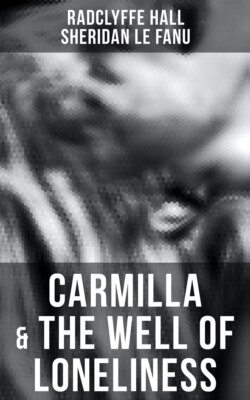Читать книгу Carmilla & The Well of Loneliness - Radclyffe Hall - Страница 62
На сайте Литреса книга снята с продажи.
2
ОглавлениеIn her vast drawing-room so beautifully proportioned, Anna would sit with her pride sorely wounded, dreading the thinly veiled questions of her neighbours, dreading the ominous silence of her husband. And the old aversion she had felt for her child would return upon her like the unclean spirit who gathered to himself seven others more wicked, so that her last state was worse than her first, and at times she must turn away her eyes from Stephen.
Thus tormented, she grew less tactful with her husband, and now she was always plying him with questions: ‘But why can’t you tell me what Stephen said to you, Philip, that evening when she went to your study?’
And he, with a mighty effort to be patient, would answer: ‘She said that she couldn’t love Martin—there was no crime in that. Leave the child alone, Anna, she’s unhappy enough; why not let her alone?’ And then he would hastily change the subject.
But Anna could not let Stephen alone, could never keep off the topic of Martin. She would talk at the girl until she grew crimson; and seeing this, Sir Philip would frown darkly, and when he and his wife were alone in their bedroom he would often reproach her with violence.
‘Cruel—it’s abominably cruel of you, Anna. Why in God’s name must you go on nagging Stephen?’
Anna’s taut nerves would tighten to breaking, so that she, when she answered, must also speak with violence.
One night he said abruptly: ‘Stephen won’t marry—I don’t want her to marry; it would only mean disaster.’
And at this Anna broke out in angry protest. Why shouldn’t Stephen marry? She wished her to marry. Was he mad? And what did he mean by disaster? No woman was ever complete without marriage—what on earth did he mean by disaster? He frowned and refused to answer her question. Stephen, he said, must go up to Oxford. He had set his heart on a good education for the child, who might some day become a fine writer. Marriage wasn’t the only career for a woman. Look at Puddle, for instance; she’d been at Oxford—a most admirable, well-balanced, sensible creature. Next year he was going to send Stephen to Oxford. Anna scoffed: Yes, indeed, he might well look at Puddle! She was what came of this higher education—a lonely, unfulfilled, middle-aged spinster. Anna didn’t want that kind of life for her daughter.
And then:’ It’s a pity you can’t be frank, Philip, about what was said that night in your study. I feel that there’s something you’re keeping back from me—it’s so unlike Martin to behave as he has done; there must have been something that you haven’t told me, to have made him go off without even a letter—’
He flared up at once because he felt guilty. ‘I don’t care a damn about Martin!’ he said hotly. ‘All I care about is Stephen, and she’s going to Oxford next year; she’s my child as well as yours, Anna!’
Then quite suddenly Anna’s self-control left her, and she let him see into her tormented spirit; all that had lain unspoken between them she now put into crude, ugly words for his hearing: ‘You care nothing for me any more—you and Stephen are enleagued against me—you have been for years.’ Aghast at herself, she must yet go on speaking: ‘You and Stephen—oh, I’ve seen it for years—you and Stephen.’ He looked at her, and there was warning in his eyes, but she babbled on wildly: ‘I’ve seen it for years—the cruelty of it; she’s taken you from me, my own child—the unspeakable cruelty of it!’
‘Cruelty, yes, but not Stephen’s, Anna—it’s yours; for in all the child’s life you’ve never loved her.’
Ugly, degrading, rather terrible half-truths; and he knew the whole truth, yet he dared not speak it. It is bad for the soul to know itself a coward, it is apt to take refuge in mere wordy violence.
‘Yes, you, her mother, you persecute Stephen, you torment her; I sometimes think you hate her!’
‘Philip—good God!’
‘Yes, I think you hate her; but be careful, Anna, for hatred breeds hatred, and remember I stand for the rights of my child—if you hate her you’ve got to hate me; she’s my child. I won’t let her face your hatred alone.’
Ugly, degrading, rather terrible half-truths. Their hearts ached while their lips formed recriminations. Their hearts burst into tears while their eyes remained dry and accusing, staring in hostility and anger. Far into the night they accused each other, they who before had never seriously quarrelled; and something very like the hatred he spoke of leapt out like a flame that seared them at moments.
‘Stephen, my own child—she’s come between us.’
‘It’s you who have thrust her between us, Anna.’
Mad, it was madness! They were such faithful lovers, and their love it was that had fashioned their child. They knew it was madness and yet they persisted, while their anger dug out for itself a deep channel, so that future angers might more easily follow. They could not forgive and they could not sleep, for neither could sleep without the other’s forgiveness, and the hatred that leapt out at moments between them would be drowned in the tears that their hearts were shedding.
